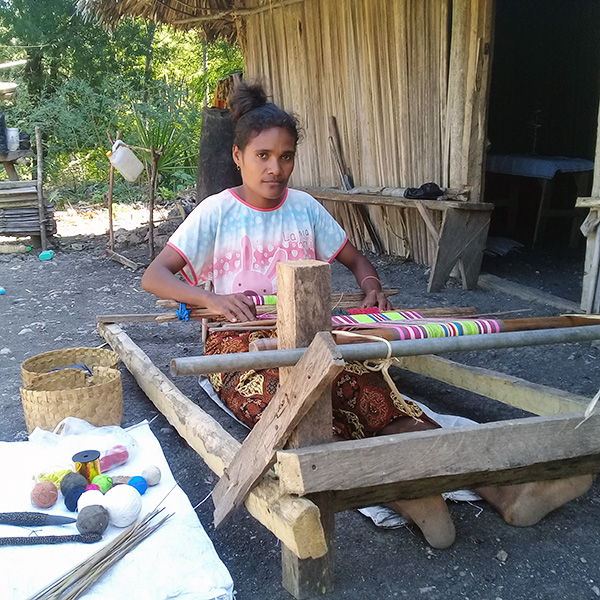Stories of Change

Mama Deni at her loom.
Keeping tradition alive…and building women’s businesses in the process
Deni Seteria Saufeto is a jack-of-all-trades in her village in West Timor, Indonesia.Besides taking care of her children and home, Mama Deni earns money weaving textiles like her mother taught her. For years, she had successfully sold shawls and blankets to family or friends. But weaving is a common way to make a living in the area, so competition for paying customers was tough.
Things changed for Mama Deni when she joined the CWS Berdaya (empowerment) initiative, which is part of a our Timor Zero Hunger program. Berdaya is designed to help women expand their earning options and potential. As you can tell from the name, Timor Zero Hunger is designed to end hunger and malnutrition in the area, especially for young children. When women are better able to provide for their families, they can feed their children better, too.
The island of Timor, where West Timor is located, is famous for its high-quality weaving, just like Mama Deni was doing. Traditional Timor weaving was done with naturally dyed threads. Recently, though, the widespread importing of cheaper, lower quality but more colorful threads was causing a move away from the natural dyeing process. The shift has been so dramatic that the skills to naturally dye the thread were nearly lost.
The local Office of Trade and Industry near where Mama Deni lives has tried to revive the practice of naturally dyeing thread. CWS recently joined our trade office colleagues to host a dyeing workshop as part of the Berdaya initiative. It was a chance for women to refresh their skills and revive their mothers’ and grandmothers’ way of weaving. They also explored new natural color combinations and weaving motifs. This helped increase the value of the scarves and blankets that participants were weaving.
Mama Deni attended the workshop and has returned to naturally dyeing her thread. She says she started seeing the benefits almost immediately. “Not only do I get new orders from outside of my village, but I see that my neighbors who used to order from other weavers have started coming to me. They have noticed my new [higher quality] work and now prefer to buy from me.”
